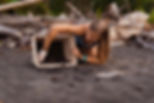
Press Kit 2024
Bio

Christine Figgener, born in 1983 in Germany, grew up in the Ruhr area and studied biology in Tübingen and Würzburg before earning her doctorate in marine biology from Texas A&M University. Since 2007, she has lived and worked in Costa Rica, researching sea turtles and fighting to protect them.
Her video of a turtle having a plastic straw painfully removed from its nose went viral, fuelling the global debate over the use of single-use plastic, which has led to bans in many countries. She was named a "Next Generation Leader" by TIME Magazine in 2018 and was the Director of Science & Education for the Footprint Foundation from 2020-2023. She founded and directs the conservation organization COASTS and the consulting firm Nāmaka Conservation Science in Costa Rica, which both strive to protect sea turtles.
She lives with her dog Fiona on the Caribbean coast of Costa Rica. When she is not rescuing sea turtles or writing, she swims as Sea Turtle Biologist through the vast expanses of the internet, trying to get more people interested in sea turtles and their conservation.
High-Resolution Images
High-Resolution Images for Press Use
Photos of Christine (Preview)

© Tanja Mikolcic 2022

© Tanja Mikolcic 2021

© Mark Guerrero/TAMU 2019

© Tanja Mikolcic 2022

© Tanja Mikolcic 2021

© Thierry Bois 2022

© Christine Figgener 2016
Book Cover (Preview)


Download of High-Res Images
Talking Points
-
Sea Turtles - How many species are there? How long have they been around? What do they eat? How to distinguish the different species? Where in the world can you observe wild sea turtles? Why are sea turtles on the brink of extinction? Which threats do they face? How is the situation for sea turtles in Costa Rica, and how in the rest of the world? Why is it important to protect sea turtles? What can every one of us do to help sea turtles survive?
-
Researching Sea Turtles - Why are scientific data important for sea turtle conservation? Why do we tag sea turtles? Why do we excavate nests? How does satellite tracking work? What do you have to do to become a sea turtle biologist?
-
Sea Turtle Conservation Work - What are the challenges? Do I have my own conservation organization? What projects do I have in Costa Rica? What else am I doing for sea turtle conservation? Which are my favourite moments working, and which are my worst? Have I experienced dangerous situations in my line of work? What is the emotional burden of sea turtle conservation work?
-
Ocean Plastic Pollution - What is the problem with plastic in our oceans? How does plastic harm marine life and especially sea turtles? How much plastic is in our oceans? What are the dimensions of the problem? How long has it been a problem? How many sea turtles have ingested plastic? What does plastic have to do with climate change? Where does most of the plastic in our oceans come from? What is microplastic? How dangerous is microplastic?
-
Science Communication - How did I become a science communicator? Why are science communication and environmental education important? Why do we need a new generation of conservationists? How do you become a better science communicator?
-
Women in Science and Fieldwork - What are the challenges? Have I ever encountered sexism in academia, or working in the field? Have I been in dangerous situations because I am a woman? What is it like to work as a woman in a country with very traditional gender ideas?
-
White Saviorism and Neocolonial Structures in Nature Conservation/ Parachute Science - What do these terms mean? Do we have enough local voices in nature conservation? Do we have enough representation of minorities in nature conservation? How can big NGOs (so-called BINGOS) do better to break up neocolonial structures? What happens to the data of scientists from the global North conducting research in the global South? What do universities and academic advisors need to do to create equal opportunities in research and support researchers from the global South?
-
Conservation K9s - What are conservation K9s? How can dogs help conserve nature and species? Why did I start to train my dog Fiona to help me with my sea turtle conservation work?


